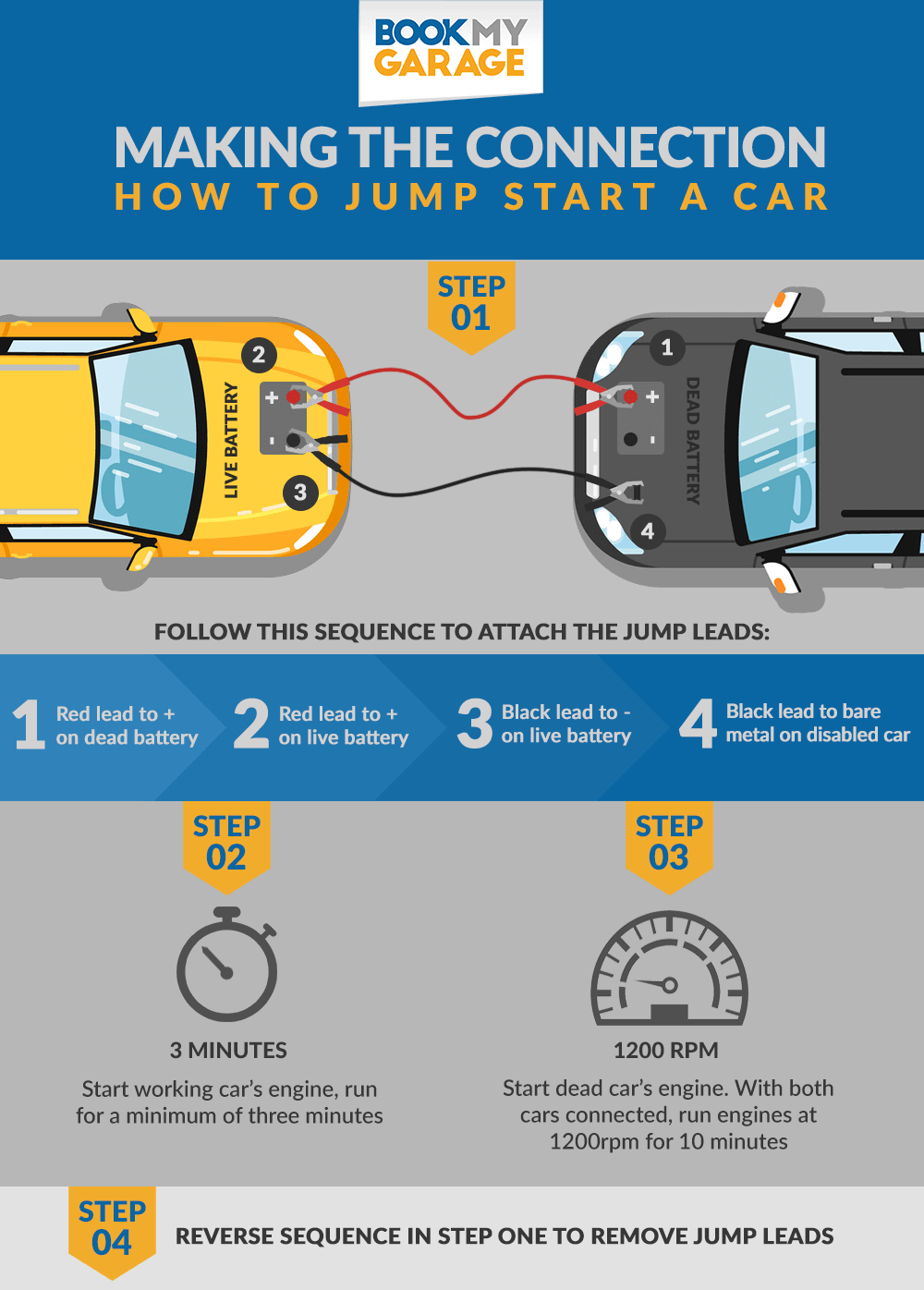If your engine won’t start, then you could have a flat battery.
Read on and find out why your battery is flat and how to jump start your car.
Page Contents
Is My Car Battery Flat?
To find out if your battery is flat, you should check if the dashboard warning lights, interior lights and electric windows are working properly.
If they aren’t - or there is a problem with central locking – then your battery may be flat.
You should try a spare key fob if your central locking isn’t working, to check this isn’t the issue.
Likewise, if the ignition key won’t turn, then your front tyre may be stuck against the kerb.
You should try to turn your steering wheel away from the kerb or rock it from side to side as you turn the key to figure out if this is the case.
A sulphuric smell can also indicate that your battery is dead.
Why Is My Battery Flat?
There are several reasons why your car battery might be flat:
- The vehicle hasn’t been used
- The car is being used for short journeys
- The lights were on overnight
- There is a charging problem
- The battery is old or undercharged
If you notice regular problems with your battery, you should seek professional help at a garage near you.
It can often be difficult to determine if the alternator or battery is to blame, but a technician will be able to pinpoint the exact issue with your car.
What Should You Do If Your Car Battery Is Dead?
If you have a dead battery, you can attempt to jump start the car yourself or call a breakdown cover provider to help you.
If you don’t feel confident jump starting a car yourself, you should trust a breakdown cover provider to do this for you.
You should switch off any electrics in the car whilst you wait for them to arrive, and should not attempt to start the engine.
A professional technician will be able to test your battery for you and will advise you on whether a replacement is necessary.
How to Stay Safe When Jump Starting a Car
There are certain safety precautions you should take before jump starting your car.
To jump start a car with jump leads, you will need a second vehicle with a fully charged battery, rubber work gloves and a pair of good quality jump leads – one negative lead and one positive lead.
Do not attempt a jump start if you find any damage to either of the batteries or jump leads.
If the jump leads get hot, you should stop using them.
You should not use a hybrid or electric car for this, as this could cause damage.
Take care to remove any dangling clothing or metal jewellery and ensure that no metal objects touch the battery terminals.
Remember, batteries produce flammable gases, so you should never smoke or have naked flames near car batteries.
Make sure that all electrical systems and devices in the car with the flat battery are switched off before you begin, and take the key out of the ignition.
Lower the driver's window if this is possible, too.
How to Connect and Disconnect Jump Leads Correctly
If you don't connect the jump leads in the right order, you can damage the car's electrics by surging power through the alternator or even hurt yourself.
The correct order to attach jump leads is:
- Attach the red lead to the positive terminal (+) of the dead car’s battery.
- Attach the red lead to the positive terminal of the working car’s battery.
- Attach the black lead to the negative terminal (-) of the working car’s battery.
- Attach the black lead to a piece of bare metal on the disabled car’s chassis or engine. You should attach this away from the battery and the fuel system.

To disconnect the jump leads, follow these steps:
- Remove the black lead from the ‘dead’ car.
- Remove the black lead from the working car.
- Remove the red lead from the working car.
- Remove the red lead from the ‘dead’ car.
How to Jump Start a Car with Jump Leads
Follow these steps to jump start your car:
- Line up both cars
- Open both bonnets
- Connect the red jump lead
- Connect the black jump lead
- Start the casualty vehicle
- Switch both engines off
- Call for help if required
Line Up Both Cars
To jump start a car with a flat battery, ensure the second vehicle is parked close to the one with the dead battery – without the vehicles touching.
You can park the cars either end to end or side by side.
Both vehicles should be static and parked in a safe place – either off the road or near the kerb – with the handbrake on and the ignition off.
It goes without saying that you should ask for the other vehicle owner’s permission before you attempt to jump start your car!
Open Both Bonnets
Using the bonnet release – which can be found either inside of the car or in the front grill – you should next open the bonnet on both cars.
Locate the battery terminals in each car.
Please note that in some cars the battery may be located in the boot.
You can refer to the owner’s manual for more information.
Connect the Red Jump Lead
You should wear rubber work gloves as you carry out the following steps.
On the vehicle with the flat battery, you should connect one end of the positive red jump lead to the positive terminal of the battery.
The positive terminal usually has a red plastic cover marked with a plus sign (+) on it.
You can pull this cover back to access the terminal.
Next, attach the other end of the red jump lead to the positive terminal of the good battery on the second vehicle.
Connect the Black Jump Lead
Now you can attach one end of the black jump lead to the negative terminal of the good battery.
Then you can attach the other end of the black jump lead to a good earth point on the casualty vehicle, such as a solid metal part of the engine.
Start the Casualty Vehicle
You can try to start the casualty vehicle.
If - after a few attempts - the car still doesn’t start, it is likely that there is a more serious issue which needs to be addressed and you will need to have your vehicle towed to a local garage.
If the vehicle does start, keep both cars connected and leave it running for at least 10 minutes.
You should keep both vehicles running at about 1200RPM during this process to charge the battery.
Switch Both Engines Off
Once the vehicle has been left running, you can switch both engines off and disconnect the black jump lead from the dead battery.
Check the engine starts again, and then disconnect the rest of the jump leads in the correct order.
The vehicle that had the dead battery should then be taken for a 30 minute drive – not in stop-start traffic - to fully charge the battery.
Call for Help If Required
If your vehicle still won’t start, you should contact a breakdown cover provider to help you.
Is Jump Starting a Car Dangerous?
When done incorrectly, jump starting a car can be dangerous.
For instance, if you jump start a car with a leaking vehicle battery, this could lead to an explosion.
Using jump leads in the wrong way could cause you to get hurt, or cause damage to the electrical systems in your vehicle.
That’s why it is important that you entrust this job to a professional if you don’t feel confident doing this yourself.
FAQs
What Are Jump Leads?
Can You Jump Start a Car in the Rain?
How Often Should You Change a Car Battery?






